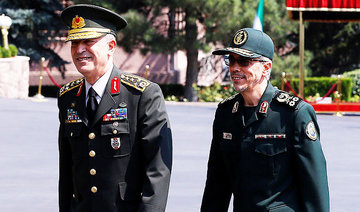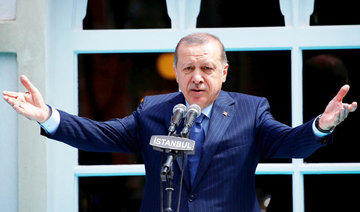ANKARA: The conflict in Syria will top the agenda when the Turkish President Recep Tayyip Erdogan arrives in Jordan on Monday for an official visit at the invitation of King Abdallah.
Jordan and Turkey host millions of Syrian refugees, and take part in regional and international efforts to end the crisis. Jordan supports Turkey’s initiatives to co-broker a cease-fire in Syria through negotiations in the Kazakh capital, Astana. The two countries are also involved in the US-led anti-Daesh coalition in Syria and Iraq.
The two leaders “will discuss the situation in the region, especially in Syria, Iraq and Palestine, during his visit,” Erdogan’s spokesman Ibrahim Kalin said. “This visit is important in terms of foreign policy perspective.”
Erdogan will continue with trips to Kazakhstan, Azerbaijan and the US in September. The flurry of Turkish diplomatic activity suggests closer cooperation between Turkey, Iran and Russia in Syria, said Gonul Tol, director of the Center for Turkish Studies at the Middle East Institute in Washington.
“Jordan has played an important role in the Syrian conflict and lately has been a party to the de-escalation agreement in southern Syria,” she said. “Jordan and Russia have also worked closely in Syria, sharing intelligence and carrying out military aircraft missions.”
Tol said Erdogan’s visit to Jordan was part of that Syria diplomacy, and that Turkey and Jordan might seek ways to tackle challenges in the post-Daesh Iraq.
“Jordan also plays an important role in Iraq. Now that the defeat of Daesh in Iraq is seen as imminent, Iraq depends on Jordan to ensure Iraq’s primary gateway to the world remains open,” she said.
Erdogan’s visit also coincides with the 70th anniversary of diplomatic ties between the two countries, which date to 1947.
The president will be followed to Amman by US Secretary of Defense James Mattis, who will travel to Jordan and then to Turkey later this month, the Pentagon said on Friday.
Sharing borders with Syria and Iraq, the Syrian conflict and the advance of militants in the region push Turkey and Jordan to further cooperate because of their internal security calculations.
Turkey and Jordan recently reacted against Israeli restrictions on Palestinians over Al-Aqsa Mosque, and called for the de-escalation of the situation. King Abdallah and Erdogan spoke by telephone on June 24 specifically about the latest developments at Al-Aqsa, and agreed to cooperate on the resolution of the conflict.
Nimrod Goren, head of Mitvim — the Israeli Institute for Regional Foreign Policies — said that because Jordan had a formal special status in Jerusalem, it often played a major role in calming the situation between Israel and the Palestinians.
“Jordan did so last month, but this time Turkey also tried to build on its recent efforts to gain influence in East Jerusalem,” Goren said. “While Jordan convened the foreign ministers of the Arab League, Turkey initiated a meeting of the Organization of Islamic Cooperation.”
Now, with the crisis over, the two countries may be trying to draw lessons. “King Abdallah already visited Palestinian President Mahmoud Abbas, and may now be trying to agree on future rules of engagement with Erdogan,” he said. “The Turkish president, on the other hand, is in the midst of regional meetings, with parties who are often at odds with each other — ranging from the Gulf, to Iran, and now Jordan.”
Goren said Turkey was trying to navigate its way in the changing Middle East, which now had several crises, each of which created a different coalition. “Many in Israel are worried by the recent rapprochement between Turkey and Iran, and attribute this to an emerging anti-Israeli axis. Erdogan’s visit to Jordan — a moderate regional actor with peaceful relations with Israel — should lessen such concerns,” he said.
Developing trade and increasing investments are also on the agenda during Erdogan’s visit. Turkey and Jordan enjoy increasing bilateral trade, which has reached $1 billion a year.
Jordan visit: Erdogan in new push for Syria peace
https://arab.news/p7m85
Jordan visit: Erdogan in new push for Syria peace

Turkiye attacking Kurds in northern Syria will be dangerous, Iraqi FM tells Davos

DAVOS: Turkiye attacking Kurdish forces in northern Syria would be dangerous and would create more refugees in neighboring Iraq, said Fuad Hussein, Iraq’s foreign minister, at the World Economic Forum in Davos on Thursday.
Regional leaders discuss key Middle East issues at WEF

DAVOS: During the World Economic Forum, key Middle Eastern leaders addressed pressing regional issues, highlighting the importance of cooperation and political solutions for lasting peace.
Jordan's Foreign Minister, Ayman Al Safadi, emphasized the need for understanding the root causes of conflicts, particularly the October 7 incident, in order to prevent future violence. He reiterated Jordan's commitment to partnering with the US to promote peace in the Middle East.
Syria’s Foreign Minister, Asaad Hasan Al-Shaibani, voiced concerns about the impact of international sanctions, stating that their removal is crucial for Syria’s development and a better future for its people. He also called for greater support in advancing Syria’s political process.
Iraq's Foreign Minister, Fuad Hussein, warned that instability in northern Syria could lead to an influx of refugees into Iraq and jeopardize security, particularly with the potential release of thousands of terrorists from prisons in the region. He also expressed concern about the ongoing tensions between Tehran and Washington, urging both sides to pursue a diplomatic approach.
Jordan’s crown prince meets Bahrain, Kurdistan leaders in Davos

- Crown Prince Hussein seeks to boost cooperation in the region
- Joins session on artificial intelligence, global skills development
DUBAI: Representing King Abdullah at the World Economic Forum in Davos, Crown Prince Hussein bin Abdullah held meetings recently with regional leaders to reinforce Jordan’s commitment to fostering cooperation and addressing pressing challenges in the region.
The crown prince met with Sheikh Isa bin Salman Al-Khalifa, head of Bahrain’s delegation, to discuss ties between the two nations, according to reports.
Their talks focused on enhancing economic and technological cooperation and advancing training programs to help young people prepare for the workplace.
In addition, they reviewed regional developments, stressing the importance of sustaining the Gaza ceasefire and ensuring the delivery of humanitarian aid.
In a separate meeting with Kurdistan Regional Government Prime Minister Masrour Barzani, the discussions focused on relations between Jordan and Iraq.
The officials also spoke about boosting collaboration, especially in economic and technology fields, and addressing key regional issues.
The crown prince also participated in a session on enhancing the skills and productivity of people in the age of artificial intelligence.
The session addressed the WEF’s 2020 initiative to train 1 billion people globally by 2030, which is aimed at closing skill gaps and preparing workers for rapid technological advancements.
The participants at the 55th WEF, held under the theme “Cooperation for the Smart Age,” include heads of state, global CEOs and entrepreneurs, who have gathered to discuss strategies for growth, investing in people, and managing challenges in the energy sector and beyond.
The crown prince was accompanied by Deputy Prime Minister and Minister of Foreign Affairs and Expatriates Ayman Safadi, Jordan’s Ambassador to Switzerland Nawaf Al-Tal, and Director of the Office of the Crown Prince Dr. Zaid Al-Baqain.
Hundreds leave West Bank camp during Israeli raid: Palestinian official

- The Israeli military launched an operation in Jenin on Tuesday, saying it aims to uproot Palestinian militants in the camp and the city.
Jenin: A Palestinian official said hundreds of residents of the occupied West Bank’s Jenin refugee camp were leaving their homes Thursday, days into a large-scale Israeli raid in the area.
“Hundreds of camp residents have begun leaving after the Israeli army, using loudspeakers on drones and military vehicles, ordered them to evacuate the camp,” where Israel’s military launched an intense military operation this week, Jenin governor Kamal Abu Al-Rub told AFP.
The army told AFP that it was “unaware of any evacuation orders for residents in Jenin as of now.”
Salim Saadi, a Jenin resident who lives on the edge of the refugee camp, told AFP that the army had asked camp residents to leave between 9:00 am (0700 GMT) and 5:00 pm.
“There are dozens of camp residents who have begun to leave,” he said.
“The army is in front of my house. They could enter at any moment.”
The Israeli military launched an operation in Jenin on Tuesday, saying it aims to uproot Palestinian militants in the camp and the city.
The offensive began just days after a ceasefire deal paused fighting in the Gaza Strip.
The Israeli assault has killed at least 10 Palestinians and injured 40 more, according to the Ramallah-based Palestinian health ministry.
Israeli Prime Minister Benjamin Netanyahu said that “Operation Iron Wall,” as it has been dubbed, will “eradicate terrorism” in the West Bank city known as a bastion of Palestinian militancy.
Israeli army says killed two Palestinian militants in West Bank

- The Ramallah-based Palestinian health ministry said Israeli authorities had informed it of the deaths of Nazzal, 25, and Shalabi, 30
Ramallah: The Israeli military said Thursday it killed two Palestinian militants overnight near the occupied West Bank city of Jenin, where a large-scale raid is underway, accusing them of murdering three Israelis.
In a statement, the military said that Israeli forces found the two militants barricaded in a house in the village of Burqin.
“After an exchange of fire, they were eliminated by the forces,” it said, adding one soldier was injured in the exchange.
The military identified those killed as Mohammed Nazzal and Qutaiba Shalabi, accusing them of being “affiliated with Islamic Jihad” and responsible for a deadly shooting on an Israeli bus in early January.
The Ramallah-based Palestinian health ministry said Israeli authorities had informed it of the deaths of Nazzal, 25, and Shalabi, 30.
“The bodies are being withheld” by the army, it added in a statement.
Three Israelis were killed and six injured in a January 6 attack near the village of Al-Funduq, also in the West Bank.
Israel’s Defense Minister Israel Katz said at the time he had directed the military to “act with force” to find the attackers, vowing on X that “anyone who... enables or supports the murder and harm of Jews will pay a heavy price.”
The night that followed the attack saw several instances of violent altercations with settlers in that part of the West Bank, including in the village of Hajja, whose mayor told AFP it had come under attack.
Violence has surged throughout the occupied West Bank since the Gaza war erupted on October 7, 2023.
According to the Palestinian health ministry, Israeli troops or settlers have killed at least 850 Palestinians in the West Bank since the conflict began.
During the same period, at least 29 Israelis, including soldiers, have been killed in Palestinian attacks or Israeli military operations in the territory, according to Israeli official figures.











